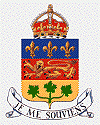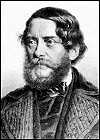|

|
|
|
|
|
Hungary (Dabas) |
 |
Parliamentary byelection in Dabas constituency. Results : Lajos Szuecs the joint candidate of the three government coalition parties has won the second, final, round of the by-election in the central Hungarian Dabas constituency with 54.8 percent of the votes. The candidate of the opposition Hungarian Socialist Party came second of the five candidates with 39 percent of the votes. |
|
Russia (Evenk Autonomus Okrug) |
 |
Gubernatorial election. Results : YUKOS executive Boris Zolotarev won the gubernatorial elections in Evenk Autonomous Okrug with 51.8 percent of the vote. His closest competitor, Yevgenii Vasiliev, chief federal inspector to Evenk and Taimyr Autonomous okrugs, polled 35.3 percent. |
|
Russia (Tula) |
 |
Gubernatorial election. Results : Tula Oblast Governor Vasilii Starodubtsev received 49.09 percent of the vote, but he will still need to compete in a second round scheduled for April 22. Tula : No flag nor arms |
|
Peru |
 |
Presidential and parliamentary elections. Presidential results : Alejandro Toledo wins about 36% of the vote, followed by former president Alan García Pérez with about 26% and Lourdes Flores with about 24%. Runoff in May. Parliamentary results : Alejandro Toledo's Perú Posible polled the largest share of votes in congressional elections, but with just 26.2%, is far from having a majority. Alan García's Apra will be the second-largest party in congress with 20% of the vote. That right-wing former lawmaker Lourdes Flores' National Unity party won about 13 percent of congressional seats. With a cluster of small parties holding the balance. |
|
Canada (Quebec) |
 |
Provincial byelection in Montreal's Mercier riding. Results : Nathalie Rochefort, P.L.Q.- 34,57 % ; Claudel Toussaint, P.Q.- 28,60 % ; Paul Cliche, IND- 24,19 % ; André Larocque, A.D.Q.- 6,25 % ; Pierre Audette, B.P.- 5,18 % ; Man Yee Cheung,Man Yee - 0,43 % ; Charles Robidoux, IND- 0,37 % ; Régent Millette, IND- 0,22 % ; Michel Prairie, 0,19 % ; Taux de participation : 41,15 %. Nathalie Rochefort of the Quebec Liberal Party has won the provincial by-election this central Montreal constituency. |
|
United States (California) |
 |
Los Angeles, Mayoral election. Results : The former state Assembly Speaker Antonio Villaraigosa had 30 percent, or 138,275 votes. City Attorney James Hahn had 25 percent, or 115,131 votes. Republican real estate broker Steve Soboroff, Riordan's choice, had 21 percent, or 96,685 votes. The tight three-way race left all the candidates with less than 50 percent of the vote, triggering a June 5 runoff between the top two contenders - Villaraigosa and Hahn. |
|
United States (California) |
 |
Special election primary 32nd Congressional District. Results : The former U.S. Ambassador to Micronesia Diane Watson is headed for a runoff to replace the late Rep. Julian Dixon in Congress. With 87 percent of precincts reporting, Watson had 33 percent, or 26,808 votes; state Sen. Kevin Murray had 27 percent, or 21,723 votes; and City Councilman Nate Holden had 17 percent, or 13,651 votes. Though a Republican and two minor party candidates also advance to a runoff, Watson, the Democrat, is considered to have a lock - the district is 73 percent Democratic. |
|
United States |
 |
Jane Swift replaces Paul Cellucci as governor of Massachusetts. Swift, 35, is a native of North Adams. Graduated from the North Adams Public Schools and earned her Bachelor of Arts degree from Trinity College in 1987. She is a corporator of the Massachusetts College of Liberal Arts and sits on the Board of Directors for the Western Massachusetts Girl Scout Council. In 1997, Swift became Director of the Massachusetts Office of Consumer Affairs and Business Regulation and had been Director of Regional Airport Development at the Massachusetts Port Authority before assuming that position. On November 3, 1998, Jane Swift was elected Lieutenant Governor of Massachusetts. Her career in government began in 1991 when, at 25, she was the youngest woman ever elected to the Massachusetts State Senate. |
|
Czech Republic |
 |
Resignation of Czech Finance Minister Pavel Mertlik. Mertlik and two key officials announced their resignation, rocking the Czech government and its ambitious program of privatization that is propping up the nation's sagging finances. Graduated from the Great School for Economics in Praha (dep. of National Economy), Mr. Mertlik served in the School as an assistant teacher until 1989 when ha was promoted as a searcher to the Institute for Forecast of the Czech Republic. Two years later, following the Institute's disappearance, he became a lecturer at the Social Science faculty in Charles University in Praha. He is still a member of the university. From 1995, he held the position of searcher at the Institute for Economics from the National Czech Bank and since June 1998, he's served as a searcher in the Center for the Czech Republic's Integration into the European Economy (Great School for Economics in Praha). M.Mertlik has been a member of the social democratic party since 1995, and Chairman of its economic committee. |
|
India (Bihar) |
 |
Bihar (India), Panchayat elections - 1st of 6 phases. Polling would be held on April 11, 15, 19, 23, 27 and 30. Results : |
|
Moldova |
 |
President Vladimir Voronin signed a decree giving parliament two weeks to confirm 37-year-old businessman Vasily Tarlev as prime minister of this impoverished former Soviet republic. |
|
Ukrainia |
 |
217 parliamentarians called in a petition for the government to be removed. Under the Ukrainian constitution if the motion is passed, the government would have to be removed within 60 days. President Leonid Kuchma would not have a right of veto. |
|
Poland |
 |
Former Polish sports minister Jacek Debski, who fought and ousted scandal-prone communist-era soccer bosses, died on Thursday after being shot in the head in what investigators suspect was a revenge killing. Debski served as sports minister between 1997 and 2000 under Prime Minister Jerzy Buzek after earlier running the state-owned tobacco company and a distillery. He made international headlines in 1998 when he launched a campaign to oust the leadership of the Polish Soccer Association (PZPN), which he accused of being ruled by an incompetent and scandal-prone clique of communist-era has-beens. Debski, a nationalistic member of the anti-communist opposition before the 1989 fall of the old regime, embarrassed his ruling Solidarity bloc last year, when he accused his party colleagues of blackmail. |
|
Czech Republic |
 |
Jirí Rusnok is named finance minister, following the resignation of Pavel Mertlík. |
|
Congo, Democratic Republic of the |
 |
Joseph Kabila named a new Cabinet. See new Government next week |
|
Vanuatu |
 |
New Prime Minister, Edward Natapei, has vowed to set up a commission of inquiry into the country's finances and investigate the former prime minister's,Barak Sope, business dealings. |
THIS WEEK'S STORY
|
April 14
|
Hungary declared itself independent of Austria with Lajos Kossuth as its leader. In the second quarter of the 19th cent. a movement that combined Hungarian nationalism with constitutional liberalism gained strength. Among its leaders were Count Szechenyi, Louis Kossuth, Baron Eötvös, Sándor Petofi, and Francis Deak. Inspired by the French Revolution of 1848, the Hungarian diet passed the March Laws (1848), which established a liberal constitutional monarchy for Hungary under the Hapsburgs. But the reforms did not deal with the national minorities problem. Several minority groups revolted, and, after Francis Joseph replaced Ferdinand VII as emperor, the Austrians waged war against Hungary (Dec., 1848). In Apr., 1849, Kossuth declared Hungary an independent republic. Lajos Kossuth was born in Monok, Hungary, in 1802. A lawyer with radical political views, he was constantly in trouble with the authorities and in 1837 was imprisoned for publishing attacks on the government. After being released in 1840 Kossuth became editor of the Pesti Hirlap. Elected to the Hungarian Diet, Kossuth became the leader of the extreme liberals and after the French Revolution of 1848 demanded an independent government for Hungary. When Austria and Hungary went to war at the end of 1848 Kossuth became provisional governor of the country. The following year Kossuth declared Hungary's independence with himself as president. Hungary managed to repulse the Austrian Army but the regime collapsed when Russia joined the war. Kossuth fled to Turkey where he was made a prisoner until being released in September, 1851. Later that year he moved to the United States where he joined a group of Hungarian political refugees who had established the community of New Buda in Decatur County, Iowa. Over the next few years Kossuth also lived in England and Italy. Despite his strenuous efforts, Kossuth was unable to return to power in Hungary. Lajos Kossuth died in 1894. |
